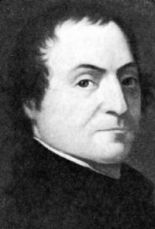William Williams
 From Conservapedia
From Conservapedia | Founding Fathers | |
|---|---|

| |
| William Williams | |
| State | Connecticut |
| Religion | Christian- Congregationalist [1] |
| Founding Documents | Declaration of Independence |
William Williams (April 23, 1731 – August 2, 1811) is an American Founding Father. He was a Harvard graduate, a Continental Army veteran, a merchant. William Willams would be a Town Clerk for forty-four years, a Selectman for twenty-five years, Provincial Representative, Council to the Legislature, State Legislator, Speaker of the House for nearly forty years. He became a delegate to colonial conferences and elected delegate of Connecticut to the Continental Congress that signed the Declaration of Independence. He was known to have a fiery temper and strong feelings for support of the colonies.[2]
Early life[edit]
William Williams was born in Lebanon, Connecticut, the son of a minister, Tim Solomon Williams.[3] His father Reverend Solomon was the pastor of the First Congregational Church for over 50 years.[4] William received a standard education, then went to Harvard and graduated as a merchant. Afterwards, he would follow in his fathers footsteps and study theology. For a year he would prepare for the ministry. Then Williams decided to enlist in the Continental Army and joined his uncle, Colonel Ephraim Williams, in the French and Indian War.[5] Subsequently, his Uncle was killed, shot in the head and Williams returned home to Lebanon.
He would open a store in his hometown that he called The Williams Inc.,[6] and he became active with the Sons of Liberty.[7] In 1771 he married Mary Trumbull, Governor Jonathan Trumbull's daughter. They would have three kids; Solomon, Faith, and William Trumbull.[8] Williams worked his way up to Colonel in the militia but resigned when he served Congress.
American Revolution[edit]
William Williams would replace Oliver Wolcott in the Continental Congress. He arrived too late to vote for independence but he did sign the Declaration. Williams support for independence was personal, having donated his own money for military activities. He went house to house soliciting private donations to supply the army. Frequently, Williams gave speeches for enlistment to the cause of independence. He gave his house up for officers to stay during the winter of 1781.
Williams was appointed a member of the committee on the Articles of Confederation. In 1777 he was appointed to the Board of War. After the war, he attended the convention where Connecticut ratified the Federal Constitution. Williams spent his remaining years as a County Court judge for Windham County.
Death[edit]
Williams died in Lebanon at the age of eighty.
References[edit]
- ↑ http://www.adherents.com/gov/Founding_Fathers_Religion.html
- ↑ William Williams, thedeclarationofindependence.org
- ↑ William Williams (signer), BU.edu
- ↑ The Military History of Ohio
- ↑ William Williams, USHistory.org
- ↑ [1]
- ↑ A Synopsis of the Signers of the Declaration of Independence
- ↑ The Genealogy and History of the Family of Williams in America
| ||||||||||||||||||||||||||||||||||||||||||||||||||
Categories: [Founding Fathers] [American Revolution]
↧ Download as ZWI file | Last modified: 03/14/2023 05:32:02 | 169 views
☰ Source: https://www.conservapedia.com/William_Williams | License: CC BY-SA 3.0
 ZWI signed:
ZWI signed:
 KSF
KSF